2020年牛津译林版六年级英语下册全册复习资料
2020年牛津译林英语六年级下册总复习用所给词适当形式填空专项练习及答案

2020年牛津译林英语六年级下册总复习用所给词适当形式填空专项练习及答案用所给词适当形式填空专项练习根据句意,用括号内所给词的适当形式填空。
1. You can ask (they) some questions.2. My clothes (be) on the bed.3. Look! (this) are his books.4. Jack (sing) three songs at the party yesterday evening.5. Excuse (I) . Where is the park?6. There are two (man) teachers in the room.7. The __________(child) are watching TV now.8.They__________(fly)kites in the playground(操场) last Sunday.9.Do you want___________(stay)at home today?10.It was a_____________(rain)day.11.His father is in the__________(live)room.12.It often_________________(snow)in winter.13.He_____________(take) a train to Changsha tomorrow.14.He can throw the ball___________________(easy).15.There are eleven_____________(play)in our team.16.I eat cabbages_________________(one) a week.17.You need to eat vegetables for a______________(health)body.18.The girls enjoy_____________(listen)to music.19.They are playing____________(happy)in the park.20.We must brush our___________(tooth)every morning.21.His sister usually_____________(lie)on the bed.22.The boys are doing___________(they)homework in the classroom now.23.How much is this pair of _________________(shoe)?24.________________(not open) the door.25.This pen is Tom’s. That pen is ________________(Mike).26. The music will (is) good for me.27. Don’t ask (she) any questions.28. Why didn’t help (they) with their English?29.She looked at him (sad) and said nothing.30. Kate is ill. Her mother is (worry) about her.31. Yesterday I helped to find a (lose) boy.32. My mother helps us (speak) English.33. This book is very (excite), so we all like (read) it.34. There (be) some good news for you.35. He has tried (two) ,but he failed.36. Surfing is a (pop) water sports.37. We all had an (enjoy) evening.38. What is the (little) expensive by bus by train or by plane?39. I (teach) here ten years ago.40. Would you like (use) my bike?41. The students of Class Two (sweep) their classroom now.42. People (not listen) to the radio at that time.43. It’s better to give than (receive)44. When you (live) in this town?45. You (come) here last year.46. When (you) (see) him? I (see) him lastSunday.47. The car is (use) .48. I didn’t know what (happen).49. What’s wrong with ________(they)?50.The workers (build) ten years ago.51. We must (clean) the table once a day.52. The dog (lie) on the floor now.53. She (visit) her aunt the next week.54. Her mother (cook) at this time yesterday.55. The students (do) their homework. (notmake) any noise!56. you (go) to Beijing last week? Yes. I (do).57. The old man often (tell) the children a story in the evening.This evening he (tell) two stories.58. Would you please tell us how (make) the watch (work)?59. She doesn’t know what (do) and where (go).60. My friend can’t decide which pair of trousers (choose). Soshe asked me to go shopping with her.61. Please wake me up five tomorrow.62. Who are you (wait) for ?63. The moon (move) round the earth.64. My brother (leave) for Hongkong next week.65. Last week we (have) a (run) race at school.66. How many (woman, teacher) are there in yourschool?67. It’s very important for us to the teacher carefullyin class. (listen)68. What about some hamburgers? (eat)69. One of my classmates very hard. (study)70. What are they doing? They (chat) under a big tree.71. She wants (buy) Olympic mascots(吉祥物) for herself.72. I like (read) very much, but I don’t like (read) today, I’m tired.73. My father (study) English very well.74. Listen ! Who (shout) for help next door.75. Can elephants (walk) on tiptoe?根据句意,用括号内所给词的适当形式填空。
牛津译林版六年级英语下册全册各单元知识点汇总

Unit 1 The lion and the mouse 姓名________短语:1.in the forest 在森林里 rge and strong 又大又壮3. walk by 走过、路过4. wake... up 吵醒、叫醒5. some day 某一天6. be angry 生气7. say quietly 小声地说8.small and weak 弱小的9. laugh loudly大声地笑10.the next day 第二天12. a large net 一个大网13.get out 出来、出去14. bite… with 用……咬8.let…go 让…走15. bite the net with his sharp teeth 用他锋利的牙齿咬破网16.hit ..hard 使劲地打16. become friends 成为朋友17. laugh happily 开心地笑18. from then on 从那时起19.at night 在夜晚20. Aesop's Fables 伊索寓言21. Chinese idiom 成语故事22. It doesn't matter. 没关系。
23.many animal stories 许多动物故事24.play table tennis 打乒乓球25.be good at... 擅长于...26.cheer for 为...喝彩27.too excited 太兴奋8. too deep 太深28.hit the ball hard 猛力地怕打球29.pour into 把....倒入30.just then 就在那时31.make a big hole 钻了一个大洞13.in the hole 在洞里 4.in the net在网子上32.let the mouse go 让老鼠离开33.Here comes the lion.这里来了只狮子。
译林牛津版六年级知识点整理

知识点归纳班级:姓名:句子时态归纳一、一般现在时(句子中通常有always,usually,often,sometimes,never,every…, on Mondays/…)1、句型结构:主语+V.(s)如果主语是三单,谓语动词加s或者es.例如:Helen likes listening to music. My sister has a toy cat.如果主语不是三单,谓语动词用原形。
例如:I like listening to music. I have a toy cat.2、动词+s/es形式(1)一般动词后加s 如 reads(2)以s、 x 、ch、 sh 结尾,加es 如 watches(3)以辅音字母+o 结尾,一般加es 如 goes(4)辅音+y 结尾,变y为i ,再加es如worries.二、一般现在进行时(句子中通常有now,listen, look, 具体时间等)1、句型结构:主语+ be +V.ing例如:I am singing in the classroom. Liu Tao is reading in the bedroom.2、动词ing形式(1)一般情况直接加ing, play — playing(2)以不发音的“e”结尾,去“e”加ing,skate — skating(3)双写词尾字母加ing,sit—sitting, swim—swimming, run—running,put—putting, get—getting, begin—beginning,shop—shopping, stop—stopping三、一般过去时(句子中通常有just now,…ago,yesterday,last…, before等)1、句型结构:主语+ V.ed谓语动词加ed(不规则动词:go-went,come-came等)例如:I listened to music last night. Liu Tao went to the zoo yesterday.2、动词ed形式(1)一般情况直接+ede.g. play – played(2)闭音节单词双写末尾单词+ede.g. stop – stopped, shop – shopped(3)原形与过去式同型e.g. read-read,hit-hit, put-put,let-let,cut-cut,lose—lost(4)以辅音+y结尾去y变i+ede.g. copy-copied,cry-cried,study-studied,become-became(5四、一般将来时(句子中通常有tomorrow,next…,soon,this afternoon,this evening)谓语动词结构是:be going to +do(表示计划、打算做…)或者will +do(表示即将发生…)句型结构:主语+ be going to / will + V.原形例如: I am going to have an English lesson tomorrow. He will have an English lesson tomorrow.动词使用1、用动词原形(1)情态动词:can,can’t ,should,shouldn’t,must,mustn’t,could,couldn’t,will,won’t 后面用动词原形,(2)助动词do,don’t, does,doesn’t,did,didn’t后面用动词原形。
译林版 六年级下英语全册重点复习
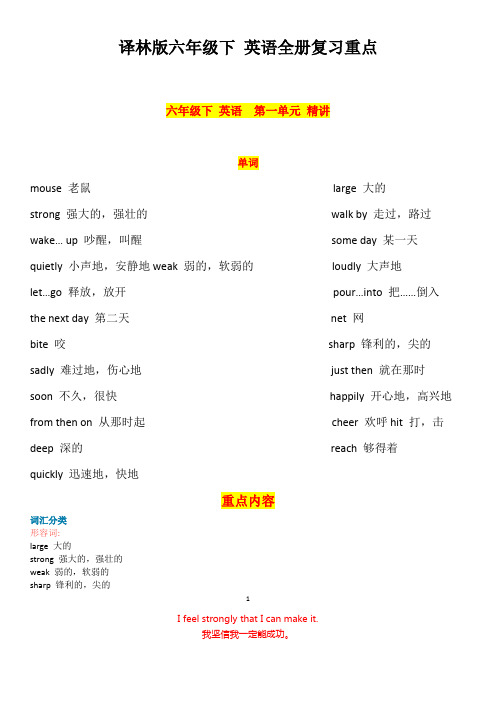
六年级下英语第一单元精讲单词mouse 老鼠large 大的strong 强大的,强壮的walk by 走过,路过wake… up 吵醒,叫醒some day 某一天quietly 小声地,安静地 weak 弱的,软弱的loudly 大声地let…go 释放,放开pour…into 把……倒入the next day 第二天 net 网bite 咬sharp 锋利的,尖的sadly 难过地,伤心地just then 就在那时soon 不久,很快 happily 开心地,高兴地from then on 从那时起cheer 欢呼 hit 打,击deep 深的 reach 够得着quickly 迅速地,快地重点内容词汇分类形容词:large 大的strong 强大的,强壮的weak 弱的,软弱的sharp 锋利的,尖的1I feel strongly that I can make it.我坚信我一定能成功。
deep 深的副词:quietly 小声地,安静地loudly大声地sadly难过地,伤心地happily开心地,高兴地quickly迅速地,快地soon 不久,很快动词:bite 咬cheer 欢呼hit 打,击reach 够得着名词:mouse 老鼠net 网短语1. walk by 走过,路过2. wake... up 吵醒,叫醒3. eat the mouse 吃这只老鼠4.be good at 擅长5. let... go 释放,放开6. pour... into 把...倒人7. in the forest 在森林里8. some day 某一天9. become friends 成了朋友10. the next day 第二天11. just then 就在那时12. from then on 从那时起13. make a big hole 弄一个大洞14. so small and weak 这么弱小15. very large and strong 非常大并且强壮惯用表达式1. How can you help me? 你能怎么帮助我?2. Thank you! 谢谢你!2I feel strongly that I can make it.我坚信我一定能成功。
六下英语各单元知识点汇总译林版(K12教育文档)

(完整word)六下英语各单元知识点汇总译林版(word版可编辑修改)编辑整理:尊敬的读者朋友们:这里是精品文档编辑中心,本文档内容是由我和我的同事精心编辑整理后发布的,发布之前我们对文中内容进行仔细校对,但是难免会有疏漏的地方,但是任然希望((完整word)六下英语各单元知识点汇总译林版(word版可编辑修改))的内容能够给您的工作和学习带来便利。
同时也真诚的希望收到您的建议和反馈,这将是我们进步的源泉,前进的动力。
本文可编辑可修改,如果觉得对您有帮助请收藏以便随时查阅,最后祝您生活愉快业绩进步,以下为(完整word)六下英语各单元知识点汇总译林版(word版可编辑修改)的全部内容。
Unit1Thelionandthemouse知识汇总【词汇】1。
large大的2.strong强壮的3。
quietly安静地;小声地4。
weak虚弱的5。
loudly大声地6.happily开心地,高兴地7.mouce 老鼠8.walkby走过,路过9。
wake…up吵醒,叫醒,弄醒,醒醒10.someday某一天11.let…go放开12.thenextday第二天网14.bite 咬15。
sharp锋利的,尖的16。
sadly难过地,伤心地17. justthen 就在那时18.soon 不久,很快19。
fromthenon 从那时起20。
cheer 欢呼21。
hit打,击22.deep 深的23.reach够得着24.quickly 迅速地,快地25.pour…into把……倒入【词组短语】狮子和老虎thelionandthemouse [mouse:复数mice 辨析mouth嘴巴month月份]又大又强壮largeandstrong又小又弱smallandweak走过…walkby走过森林walkbytheforest把狮子叫醒wakethelionup wakeme(代词宾格放中间)up [wake过去式:woke]我能在某一天帮助你Icanhelpyousomeday将来不确定的某一天someday安静地说sayquietly [quiet→quietly]大声地笑道laughloudly [loud→loudly]让狮子走letthemousego [letsbdo,let过去式:let]第二天thenextday用一个大网抓住狮子catchthelionwithalargenet [catch过去式:caught]用他的锋利的牙齿咬网bitethenetwithhissharpteeth [teeth单数:tooth bite 过去式:bit]出来getout伤心地问道asksadly [sad→sadly]就在那个时候justthen在网里弄了个大洞makeabigholeinthenet开心地说sayhappily [happy→happily]从那时起fromthenon成为好朋友becomegoodfriends [become+形容词:变得..。
最新最全译林牛津版英语六年级下册全册课件
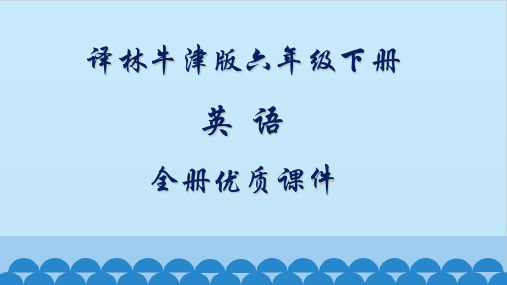
What is he good at? He is good at_r_u_n_n_in_g__.
run faster 跑得更快 Riddles:(快速阅读课文第一段,猜人物)
run as fast as 和……跑得一样快 1. He runs faster than Jim. He’s strong. Who’s he?
The elephant is stronger than the monkey .
Read and learn 读一读,学一学 当我们要对人或物进行对比时,常会用到:
形容词比较级形式 如:
longer shorter bigger smaller
fatter thinner heavier lighter
jump higher 跳得更高 2. He runs as fast as Ben. He is a good football
some of the boys 其中一些男孩 player. Who’s he ?
3. He jumps higher than some of the boys in his class. Who’s he ?
than 的前面肯定要用比较级
一、写出下列形容词的比较级
1. big –
2. fat –
3. strong –
4. heavy –
5. thin –
6. long -
二、根据中文意思填空
1. 迈克比刘涛矮。
Mike is
than Liu Tao .
2. 海伦比我大。
Helen is
than me .
He wants to do _b_e_t_te_r__ but doesn’t know how.
译林版六年级英语下册全册复习资料
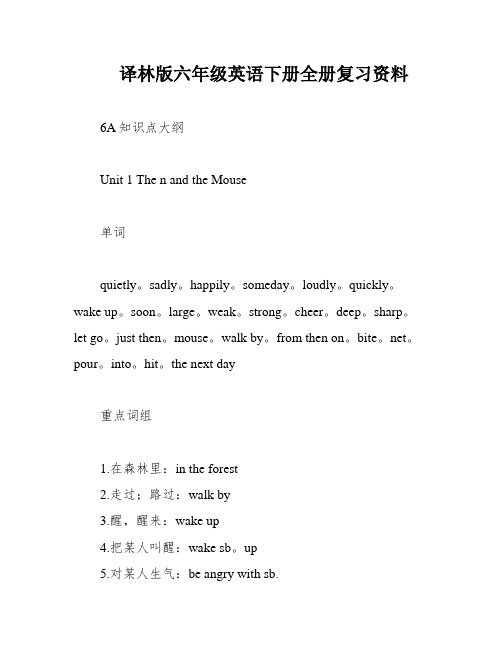
译林版六年级英语下册全册复习资料6A知识点大纲Unit 1 The n and the Mouse单词quietly。
sadly。
happily。
someday。
loudly。
quickly。
wake up。
soon。
large。
weak。
strong。
cheer。
deep。
sharp。
let go。
just then。
mouse。
walk by。
from then on。
bite。
net。
pour。
into。
hit。
the next day重点词组1.在森林里:in the forest2.走过;路过:walk by3.醒,醒来:wake up4.把某人叫醒:wake sb。
up5.对某人生气:be angry with sb.6.第二天:the next day7.对某事生气:be angry at sth.8.想要做某事:want to do sth.9.要某人做某事:want sb。
to do sth.10.某一天:someday11.小声地说:say quietly12.静静地坐着:sit quietly13.大声地笑:laugh loudly14.让某人做某事:let sb。
do sth.15.用一口大网捉住狮子:catch the n with a large net16.用锋利的牙齿咬网:bite the net with sharp teeth17.难过地问,伤心地问:ask sadly18.就在那时:just then19.开心地说:say happily20.从那时起:from then on21.成为朋友:e friends22.兴奋地说,激动地说:say excitedly23.制定研究计划:make a study plan24.没关系:It doesn't matter.25.那边的那个男孩:the boy over there26.开心地打乒乓球:play table tennis happily27.大声为某人加油:cheer for sb。
六下英语各单元知识点汇总译林版,推荐文档

六年级下册英语Unitl 知识点整理(译林版)Unit 1 The lion and the mouse知识汇总【词汇】1. large 大的3. quietly安静地;小声地4. weak5. loudly 大声地 7. mouce 老鼠 9.wake …up 吵醒,叫醒,弄醒,醒醒 10. some day 某一天 12.the n ext day 第二天 14. b ite 咬16.sadly 难过地,伤心地 17.18. s oo n 不久,很快 2. strong 强壮的虚弱的6. happily 开心地,高兴地 8. walk by 走过,路过11.let …go 放开网15. sharp 锋利的,尖的just the n 就在那时 19.from then on 从那时起21.hit 打,击 23.reach 够得着25.pour …into 把 ........ 倒入将来不确定的某一天 some day 安静地说say quietly 大声地笑道laugh loudly 让狮子走 letthe mouse go 第二天 the next day[quiet T quietly][loud T loudly] [let sb do, let 过去式:let]【词组短语】妙帀子和老虎 the lio n and the mouse [mouse: 复数 又大又强壮 large and strong 又小又弱 small and weak 走过… walk by 走过森林 walk by the forest 把狮子叫醒 wake the lio n up wake me(代词宾格放中间 我能在某一天帮助你I can help you some daymice 辨析 mouth 嘴巴 )up [wake 过去式:woke]month 月份]用一个大网抓住狮子 catch the lio n with a large net用他的锋利的牙齿咬网 bite the net with his sharp teethbit] 出来get out 伤心地问道 ask sadly [ sad T sadly]就在那个时候just then 在网里弄了个大洞 make a big hole in the net 开心地说 say happily [happy T happily] [catch 过去式:caught] [teeth 单数:toothbite 过去式:从那时起 from then on 成为好朋友 become good friends 糖果店sweet shop [become +形容词 :变得...,变成....一个棒棒糖a lollipop他会说什么? what will he say?20. cheer 欢呼 22.deep 深的 24.quickly迅速地,快地an grily: ask an grily愤怒地问 quietly: do one ' s homework carefullysleep quietlyquickly:bring some water quickly安静地睡 迅速地拿些水来beautifully: dance beautifully唱歌唱得美★系表结构:(注意不用副词)be, feel, look, sou nd, smell, become, keep +形容词★ fast ,hard ,high,early,late,形容和副词同形2、一般过去时:①过去某个时间里发生的动作或状态;② 过去习惯性、经常性的动作、行为; ③ 过去主语所具备的能力和性格。
(word版)牛津译林版六年级下册知识点汇总八个单元,文档

牛津译林版六年级下册各个单元知识点汇总Unit1Thelionandthemouse知识汇总一、四会单词大的 2.strong强壮的 3.quietly安静地;小声地4.Weak虚弱的5.loudly大声地6.happily开心地;快乐地二、三会单词老鼠mouce复数mice走过,路过walkby吵醒,wakeup某一天sameday释放不能,放开letgo第二天thenextday网net咬bite锋利的,尖的sharp难过地,伤心地sadly就在那时justthen不久,很快soon从那时起fromthenon欢呼cheer 打,击hit深的deep够得着reach迅速地,快地quickly把倒入pourinto三、短语积累狮子和老虎thelionandthemousemouse:复数mice辨析mouth嘴巴month月份又大又强壮largeandstrong又小又弱smallandweak走过walkby走过森林walkbytheforest把狮子叫醒wakethelionup(代词宾格放中间)wakemeup我能在某一天帮助你Icanhelpyousomeday将来不确定的某一天Someday:安静地说sayquietly quiet→quietly大声地笑道laughloudly loud→loudly让狮子走letthemousego letsbdo第二天thenextday用一个大网抓住狮子catchthelionwithalargenet catch过去式:caught 用他的锋利的牙齿咬网bitethenetwithhissharpteeth(tooth)bite过去式:bit出来getout伤心地问道asksadly sad→sadly就在那个时候justthen在网里弄了个大洞makeabigholeinthenet开心地说sayhappily happy→happil y从那时起fromthenon成为好朋友becomegoodfriends become+形容词变得如何糖果店sweetshop一个棒棒糖alollipop他会说什么?whatwillhesay?没关系Itdoesn’tmatter.伊索寓言Aesop’sFables一本中文成语书aChineseidiombook开心地打乒乓playtabletennishappily擅长begoodat+名词//begoodat+动词ing大声地为他们欢呼cheerforthemloudly cheerfor为欢呼击球用力hittheballhard hit打,击(过去式:hit):最后finally近意:atlast太深toodeep我够不到Ican’treachit reach到达reachmyschool迅速地拿一些水来bringsomewaterquickly把它倒进洞里pouritinthehole干得好!Welldone!四、四会句子Themoucesaidquietly.老鼠小声地说。
牛津译林版六年级英语(下册)期末复习及答案
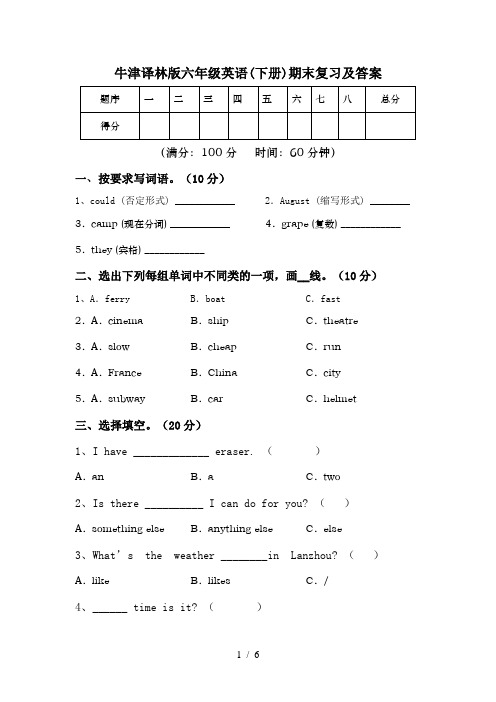
牛津译林版六年级英语(下册)期末复习及答案(满分:100分时间:60分钟)一、按要求写词语。
(10分)1、could (否定形式) ____________ 2.August (缩写形式) ________ 3.camp (现在分词) ____________ 4.grape (复数) ____________ 5.they (宾格) ____________二、选出下列每组单词中不同类的一项,画__线。
(10分)1、A.ferry B.boat C.fast 2.A.cinema B.ship C.theatre 3.A.slow B.cheap C.run 4.A.France B.China C.city 5.A.subway B.car C.helmet三、选择填空。
(20分)1、I have _____________ eraser. ()A.an B.a C.two2、Is there __________ I can do for you? ()A.something else B.anything else C.else3、What’s the weather ________in Lanzhou? ()A.like B.likes C./4、______ time is it? ()A.What B.Who C.Where5、______ hard work it is! ()A.What a B.How C.What D.How a6、I stayed at home all weekend. I ________ a cold.()A.have B.has C.had7、My dad __________ a new computer on Children’s Day. ()A.buyed me B.bought me C.bought I8、We ______ a new friend today. ()A.have B.has C.are9、There are __________ seasons in a year. ()A.three B.five C.four10、They are my _______. ()A.friend B.a friend C.friends四、按括号里的要求改变句子。
牛津译林版六年级英语下册各单元全册知识点复习整理
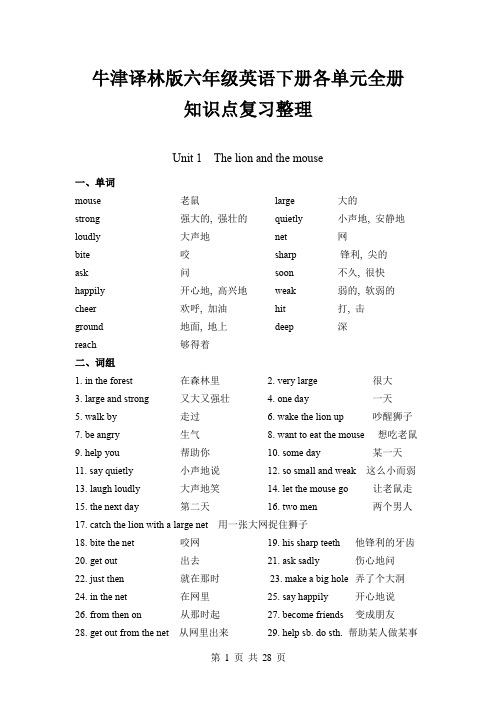
牛津译林版六年级英语下册各单元全册知识点复习整理Unit 1 The lion and the mouse一、单词mouse老鼠large大的strong强大的, 强壮的quietly小声地, 安静地loudly大声地net网bite咬sharp锋利, 尖的ask问soon不久, 很快happily开心地, 高兴地weak弱的, 软弱的cheer欢呼, 加油hit打, 击ground地面, 地上deep深reach够得着二、词组1. in the forest 在森林里2. very large 很大3. large and strong 又大又强壮4. one day 一天5. walk by 走过6. wake the lion up 吵醒狮子7. be angry 生气8. want to eat the mouse想吃老鼠9. help you 帮助你10. some day 某一天11. say quietly 小声地说12. so small and weak 这么小而弱13. laugh loudly 大声地笑14. let the mouse go 让老鼠走15. the next day 第二天16. two men 两个男人17. catch the lion with a large net 用一张大网捉住狮子18. bite the net 咬网19. his sharp teeth 他锋利的牙齿20. get out 出去21. ask sadly 伤心地问22. just then 就在那时23. make a big hole 弄了个大洞24. in the net 在网里25. say happily 开心地说26. from then on 从那时起27. become friends 变成朋友28. get out from the net 从网里出来29. help sb. do sth. 帮助某人做某事30. a happy boy 一个开心/幸福的男孩31. talk excitedly 兴奋地交谈32. the sweet shop 糖果店33. want to buy 想要买34. a lollipop 一个棒棒糖35. Aesop’s Fables 伊索寓言36. find many animal stories找到许多动物故事37. a Chinese idiom book 一本中国成语书38. play table tennis happily 开心地打乒乓39. be good at table tennis 擅长打乒乓40. cheer for them loudly 为他们大声地欢呼41. too excited 太兴奋42. hit the ball hard 用力打球43. find the ball 找到球44. find a hole in the ground 在地上找到一个洞45. in the hole 在洞里46. too deep 太深47. can’t reach it 够不着它48. have an idea 有一个主意49. bring some water quickly很快拿来一些水50. pour it into the hole 把它倒进洞里51. so many balls 这么多球52. go to a shopping centre 去购物中心53. see a small boy 看见一个小男孩54. on the floor 在地板上55. take him to an office 带他去办公室56. give him a sweet 给他一颗糖57. become happy 变得高兴58. like helping people 喜欢帮助人们59. make a study plan 制定一个学习计划60. read quietly 安静地看书61. a weak animal 一个弱小的动物62. a sharp knife 一把锋利的刀63. walk by走过, 路过64. wake . . . up吵醒, 叫醒65. some day 某一天66. the next day第二天67. just then就在那时68. get out出来, 出去69. from then on从那时起70. pour… into把…. . . 倒入三、重点句型1. One day, a mouse walked by and woke the lion up. 一天, 一只老鼠走过, 吵醒了狮子。
2020年牛津译林版六年级英语下册全册复习资料

…
大声地为某人欢呼
对…… 很兴奋 /激动
29. in the ground 在地下
30. reach the apple 够得着那个苹果
31. reach the park 到达公园
32. have an idea 有一个主意
33. bring some water quickly很快拿来水 34. pour … into …把.…… 倒入 ……
重点词组
1. in the forest 在森林里
2. walk by 走过;路过
3. wake up 醒,醒来
4. wake sb. up 把某人叫醒
(精校版)译林牛津版六年级知识点整理
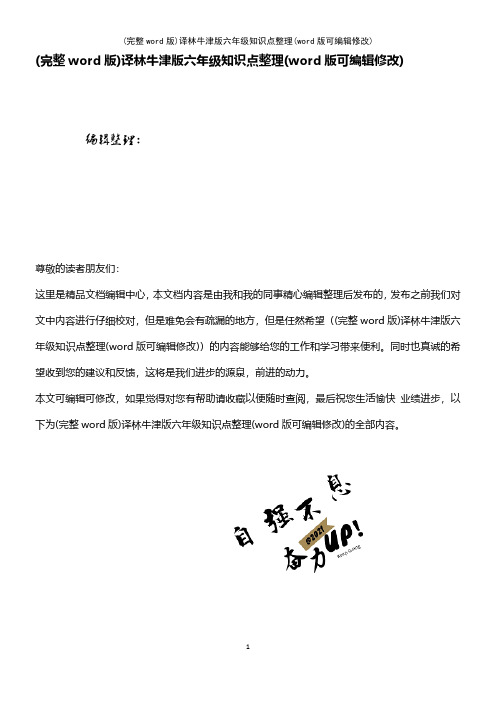
(完整word版)译林牛津版六年级知识点整理(word版可编辑修改)编辑整理:尊敬的读者朋友们:这里是精品文档编辑中心,本文档内容是由我和我的同事精心编辑整理后发布的,发布之前我们对文中内容进行仔细校对,但是难免会有疏漏的地方,但是任然希望((完整word版)译林牛津版六年级知识点整理(word版可编辑修改))的内容能够给您的工作和学习带来便利。
同时也真诚的希望收到您的建议和反馈,这将是我们进步的源泉,前进的动力。
本文可编辑可修改,如果觉得对您有帮助请收藏以便随时查阅,最后祝您生活愉快业绩进步,以下为(完整word版)译林牛津版六年级知识点整理(word版可编辑修改)的全部内容。
知识点归纳班级:姓名:句子时态归纳一、一般现在时(句子中通常有always,usually,often,sometimes,never,every…, on Mondays/…)1、句型结构:主语+V。
(s)如果主语是三单,谓语动词加s或者es。
例如:Helen likes listening to music. My sister has a toy cat。
如果主语不是三单,谓语动词用原形。
例如:I like listening to music. I have a toy cat。
2、动词+s/es形式(1)一般动词后加s 如 reads(2)以s、 x 、ch、 sh 结尾,加es 如 watches(3)以辅音字母+o 结尾,一般加es 如 goes(4)辅音+y 结尾,变y为i ,再加es如worries。
二、一般现在进行时(句子中通常有now,listen, look, 具体时间等)1、句型结构:主语+ be +V。
ing例如:I am singing in the classroom。
Liu Tao is reading in the bedroom。
2、动词ing形式(1)一般情况直接加ing, play — playing(2)以不发音的“e”结尾,去“e”加ing,skate — skating(3)双写词尾字母加ing,sit—sitting, swim—swimming, run—running,put—putting, get—getting, begin—beginning,shop—shopping, stop—stopping三、一般过去时(句子中通常有just now,…ago,yesterday,last…, before等)1、句型结构:主语+ V.ed谓语动词加ed(不规则动词:go—went,come—came等)例如:I listened to music last night. Liu Tao went to the zoo yesterday。
六下英语各单元知识点译林版
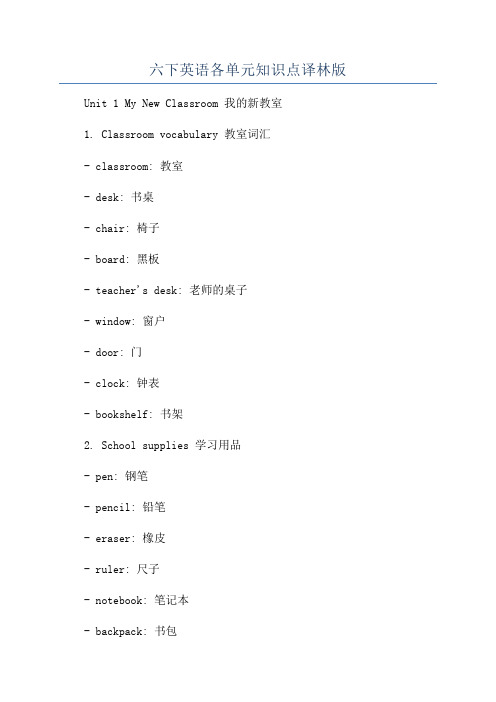
六下英语各单元知识点译林版Unit 1 My New Classroom 我的新教室1. Classroom vocabulary 教室词汇- classroom: 教室- desk: 书桌- chair: 椅子- board: 黑板- teacher's desk: 老师的桌子- window: 窗户- door: 门- clock: 钟表- bookshelf: 书架2. School supplies 学习用品- pen: 钢笔- pencil: 铅笔- eraser: 橡皮- ruler: 尺子- notebook: 笔记本- backpack: 书包- glue: 胶水- scissors: 剪刀- crayon: 蜡笔- marker: 马克笔3. Sentences 句子- This is my new classroom. 这是我的新教室。
- There is a blackboard on the wall. 墙上有一个黑板。
- I sit at the desk. 我坐在桌子旁边。
- The teacher stands in front of the classroom. 老师站在教室前面。
Unit 2 I'm a Student 我是学生1. School subjects 学科- Chinese: 语文- English: 英语- math: 数学- science: 科学- history: 历史- geography: 地理- art: 美术- music: 音乐- physical education: 体育2. Daily schedules 日程安排- I have Chinese class in the morning. 早上我有语文课。
- We have math class in the afternoon. 下午我们有数学课。
- We have art class on Wednesday. 我们星期三有美术课。
- 1、下载文档前请自行甄别文档内容的完整性,平台不提供额外的编辑、内容补充、找答案等附加服务。
- 2、"仅部分预览"的文档,不可在线预览部分如存在完整性等问题,可反馈申请退款(可完整预览的文档不适用该条件!)。
- 3、如文档侵犯您的权益,请联系客服反馈,我们会尽快为您处理(人工客服工作时间:9:00-18:30)。
6A知识点大纲Unit 1 The lion and the mouse 单词quietly 安静地sadly难过地,伤心地happily开心地,高兴得some day某一天loudly 大声地quickly迅速地,快地wake ... up吵醒,叫醒soon不久,很快large 大的weak弱的,软弱的strong强大的,强壮的cheer欢呼deep 深的sharp锋利的,尖的let ... go释放,放开just then就在那时mouse 老鼠walk by走过,路过from then on从那时起bite咬net 网pour ... into把……倒入hit打,击the next day第二天重点词组1. in the forest 在森林里2. walk by 走过;路过3. wake up 醒,醒来4. wake sb. up 把某人叫醒5. be angry with sb. 对某人生气6. the next day 第二天7. be angry at sth. 对某事生气8. want to do sth. 想要做某事9. want sb. to do sth. 要某人做某事10. some day 某一天11. say quietly 小声地说12. sit quietly 静静地坐着13. laugh loudly 大声地笑14. let sb. do sth. 让某人做某事15. catch the lion with a large net 用一口大网捉住狮子16. bite the net with sharp teeth 用锋利的牙齿咬网17. ask sadly 难过地问,伤心地问18. just then 就在那时19. say happily 开心地说20. from then on 从那时起21. become friends 成为朋友22. say excitedly 兴奋地说,激动地说23. make a study plan 制定学习计划24. It doesn’t matter. 没关系。
25. the boy over there 那边的那个男孩26. play table tennis happily开心地打乒乓球27. cheer for sb. loudly 大声地为某人欢呼28. be excited at / about…对……很兴奋/激动29. in the ground 在地下30. reach the apple 够得着那个苹果31. reach the park 到达公园32. have an idea 有一个主意33. bring some water quickly很快拿来水34. pour…into….把……倒入……35. Well done. 干得很好。
做的不错。
36. so many balls 如此多的球37. so much bread 如此多的面包38. take … to… 把…….带到…….39. become happy 变得很开心40. get out 出来,出去重点句型1. The lion was angry and wanted to eat the mouse.这只狮子很生气想要吃那只老鼠。
2. The lion bit the net with his sharp teeth.那只狮子用它的厉牙咬那个网。
3. From then on, the lion and the mouse become friends.从那以后,这只狮子和那只老鼠成了朋友。
4. The next day, two men caught the lion with a large net.第二天,两个男人用一张大网抓住了那只狮子。
5. The lion bit the net with his sharp teeth, but that did not help.那只狮子用他的厉牙咬网,但是那无济于事。
6. Here comes the lion.狮子来了。
7. One day, a mouse walked by and woke the lion up.一天,一只老鼠从狮子身边经过,弄醒了狮子。
8. The mouse said quietly. 老鼠小声地说。
9. “How can I get out ?” asked the lion sadly.“ 我怎么能出去呢?”狮子难过地问。
10. Soon, the mouse made a big hole in the net with his teeth.很快,老鼠用他的牙齿把网咬了一个大洞。
语法1、常见副词well: study well学习好 skate well滑冰好(注: well 若表示形容词,则意思为身体好)fast: run fast 跑得快 swim fast游泳快loudly: laugh loudly 大声得笑 speak loudly 大声地讲sadly: ask sadly 伤心地问 cry loudly 伤心地哭happily: sing happily 开心地唱 talk happily 开心的谈话carefully: listen carefully 认真地听 walk carefully 小心地走angrily: ask angrily 愤怒地问quietly: do one’s homework quietly安静地做作业sleep quietly 安静地睡quickly: bring some water quickly 迅速地拿些水来beautifully: dance beautifully 唱歌唱得美★系表结构: (注意不用副词)be, feel, look, sound, smell, become, keep + 形容词★fast ,hard ,high,early,late, 形容和副词同形2、一般过去式常用的时间状语ago / long long ago / yesterday / the day before yesterday in 2014 / just now(刚才) /at the age of 5(在五岁时) / once upon a time从前 / one day / last week, year, night, month, from then on3、speak ,talk,say,tell区别speak强调方式;say强调内容;tell后一定要加人或讲的内容; talk强调连续说Unit 2 Good habit单词late 迟,晚tidy干净的,整齐的bad不好的,坏的last night昨夜sleepy困的,困倦的finish完成go into走进,走入never从不fast 快地slowly慢速地badly差地,不好habit习惯put ... in order把……整理得井井有条重点词组1. many good habits 很多好习惯2. get up early 早起3. go to bed late 晚睡4. brush one’s teeth 刷牙5. put sth. in order 把东西摆放有序6. finish one’s homework完成家庭作业7. listen to the teacher 听老师的话 8. at school 在学校9. keep the room clean and tidy 保持房间干净整洁10. do well 干得好 11. some bad habits 一些坏习惯12. feel sleepy 感到困倦 13. know sb. well 对某人很了解14. walk fast 快速地走 15. Pick one! 选一个16. show sb. around sp. 带某人参观某地 17. go into 进入重点句型语法 副词的分类(1) 时间副词:常见的有now, then, soon, ago, lately, later, before, early, today, tomorrow, yesterday, tonight, suddenly, still, already, just 等。
(2) 地点副词:常见的有here, there, up, down, away, nearby, home, upstairs, downstairs 等。
(3) 方式副词:表示行为方式的副词大多以-ly 结尾,常见的有quietly, heavily, warmly, carefully, happily, angrily 等。
(4) 频度副词:常见的有always, usually, often, sometimes, never 等。
(5) 程度副词:常见的有very, much, too, greatly, really 等。
如:(6) 焦点副词:就是通过强调使之成为人们注意的焦点的副词,常见的有:only, also, just, especially, too,等。
(7) 疑问副词:就是用于引出特殊疑问句的when, where, why, how 等。
副词的顺序1. He has many good habits. 他有许多好习惯。
2. He gets up early in the morning and never goes to bed late.他早上早起,从不晚睡。
3. He brushes his teeth in the morning and before bedtime. 他早上和睡前刷牙。
4. At home, Wang Bing always puts his things in order.在家,王兵总是把他的东西摆放有序。
5. He usually finishes his homework before dinner. 他经常在晚餐前晚餐作业。
6. He listens to his teachers at school. 他在学校听老师们的话。
7. He also does well at home. 他在家也做得很好。
8. He keeps his room clean and tidy. 他保持他的房间干净和整洁。
9. He also helps his parents. 他也帮他的父母。
10. He often does his homework late at night and does not go to bed early. 他经常晚做作业,晚上不早睡。
